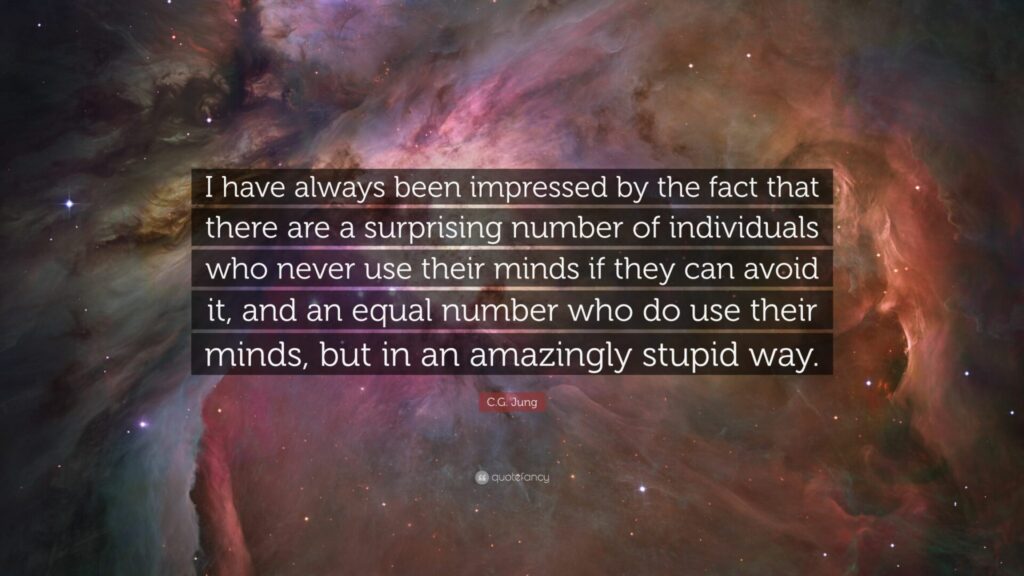
Misused Quote of Jung
“I had always been impressed by the fact that there are a surprising number of individuals who never use their minds if they can avoid it, and an equal number who do use their minds, but in an amazingly stupid way. I was also surprised to find many intelligent and wide-awake people who lived (as far as one could make out) as if they had never learned to use their sense organs: They did not see the things before their eyes, hear the words sounding in their ears, or notice the things they touched or tasted. Some lived without being aware of the state of their own bodies.
There are others who seemed to live in a most curious condition of consciousness, as if the state they had arrived at today were final, with no possibility of change, or as if the world and the psyche were static and would remain so forever. They seemed devoid of all imagination, and they entirely and exclusively depended upon their sense perception. Chances and possibilities did not exist in their world, and in “today” there was no real “tomorrow”. The future was just the repetition of the past.
I am trying here to give the reader a glimpse of my own first impressions when I began to observe the many people I met. It soon became clear to me, however, that the people who used their minds were …”
(Carl Gustav Jung)
The beginning of this quote seems very relevant for numerous situations in our chaotic state of worldly current events, and these famous words of Carl Jung are often being quoted in order to justify our own dissatisfaction with other people’s (mis)perceptions and (un)abilities of seeing the world our way.
What’s interesting is that without its intended context this quote is mostly misunderstood and abused. If someone is interested to find out exactly what was the original idea behind these words, please read Carl Jung “Man and his symbols” book, part 1 – this is where this quote is taken from (by the way, it’s very useful reading for anyone who is interested in working with their dreams).
I’ll clarify only briefly here that Jung was trying to explain that there are differences in people’s perceptions and means of processing information, and it always needs to be taken into account when interpreting other people’s dreams, because “so much depends upon the personal differences between the analyst and the analyzed”.
It’s worth mentioning that even during his lifetime Jung’s words were misunderstood and twisted so often, that he had to address and resolve this issue internally so that such situations don’t kick him out of balance anymore.
It’s quite understandable: we all tend to be triggered when our words and intentions are perceived wrongly or twisted, right? So, what do we usually do in such situations? There are two ways to resolve it: externally or internally. Jung obviously resorted to the second option and he was right: the same situation happens again and again, even after his death, so fixing this issue externally wouldn’t work anyway, but at least we can be sure that he is not bothered with people still taking advantage of his work and misusing it.
This is how it was reflected in one of his dreams that he described in the aforementioned book:
“I recall one dream of my own that I found difficult to interpret. In this dream a certain man was trying to get behind me and jump on my back. I knew nothing of this man except that I was aware that he had somehow picked up a remark I had made and had twisted it into a grotesque travesty of my meaning. But I could not see the connection between this fact and his attempts in the dream to jump on me.
In my professional life, however, it has often happened that someone has misrepresented what I have said so often that I have scarcely bothered to wonder whether this kind of misrepresentation makes me angry. Now there is a certain value in keeping a conscious control over one’s emotional reactions; and this, I soon realized, was the point the dream had made. It had taken an Austrian colloquialism and translated it into a pictorial image. This phrase, common enough in ordinary speech, is “Du kannst mir auf den Buckel steigen” (You can climb on my back), which means “I don’t care what you say about me.” An American equivalent, which could easily appear in a similar dream, would be “Go jump in the lake.”
This excellent example of Jung’s never-ending issue proves a well-known truth: the only long-term solution to any problem comes through the inner work.
Author © Margarita AoteaRa.com (@Rita.Lev)
2 LikesRecommend0 recommendationsPublished in Awakening & Ascension, Spirituality





The unexpected termination of the quote is — for me — disconcerting. I was rather identifying with and being gratified by the clear depiction of many of my own observations. The precision certain German writers have in describing theirs seems almost uncanny. I had the same reaction to some fragments I’d read by Freud. That the clarity survives translation to English makes it all the more remarkable.
hi Margarita yes this has become all to obvious in the current plandemic. we who feel more awake really need to do group meditation and increase our skills to support each other telepathically. -yes this ay be another form of seperation and elitism but to start may be the best. I guess coreys law of one is about resolving this. I have my own Ideas I hope you visit my page. thx for posting.